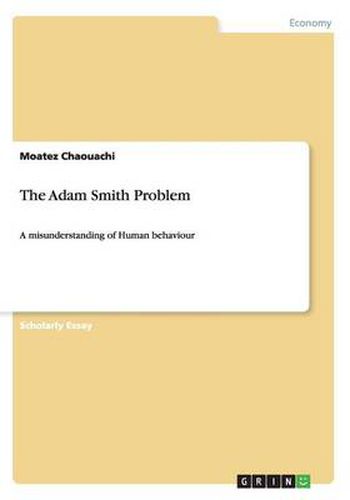Readings Newsletter
Become a Readings Member to make your shopping experience even easier.
Sign in or sign up for free!
You’re not far away from qualifying for FREE standard shipping within Australia
You’ve qualified for FREE standard shipping within Australia
The cart is loading…






Scientific Essay from the year 2012 in the subject Economics - History, grade: First, London Metropolitan University, language: English, abstract: In Wealth of Nations, Smith vehemently cited that economic practices were motivated by the principle of self-interest. On the other hand, Smith argued that economic behaviour was mainly determined by sympathy, a sentimental phenomenon that is prominent in the Theory of Moral Sentiments. As such, these two works present a moral dilemma as to whether the human behaviour in economy is motivated by self-interests or sympathy. In effect, the Adam Smith Problem revolves around the presumption that economic behaviour is driven by both social interest of benevolence and private interest of self-love. This paper presents a critical analysis of this problem. In details, the paper seeks to determine the extent to which the problem is based on a misunderstanding of human behaviour.
$9.00 standard shipping within Australia
FREE standard shipping within Australia for orders over $100.00
Express & International shipping calculated at checkout
Scientific Essay from the year 2012 in the subject Economics - History, grade: First, London Metropolitan University, language: English, abstract: In Wealth of Nations, Smith vehemently cited that economic practices were motivated by the principle of self-interest. On the other hand, Smith argued that economic behaviour was mainly determined by sympathy, a sentimental phenomenon that is prominent in the Theory of Moral Sentiments. As such, these two works present a moral dilemma as to whether the human behaviour in economy is motivated by self-interests or sympathy. In effect, the Adam Smith Problem revolves around the presumption that economic behaviour is driven by both social interest of benevolence and private interest of self-love. This paper presents a critical analysis of this problem. In details, the paper seeks to determine the extent to which the problem is based on a misunderstanding of human behaviour.